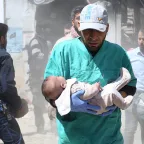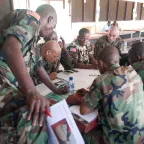Ethical decisions - good but not always easy to make
… Similarly, when cooperating with local health-care systems or treating local populations, … health-care personnel at risk and thus endangers the provision of medical care. …
… Similarly, when cooperating with local health-care systems or treating local populations, … health-care personnel at risk and thus endangers the provision of medical care. …

… media. A round-table on the safety of Swedish health-care personnel was also organized, and … You can still find us at www.healthcareindanger.org , but there are now even more …

… of assaults or threats against patients, health-care personnel, ambulances or medical … of the iceberg of all the violence affecting health care worldwide, the ICRC report allows …
… of the stories told by the new set of five Health Care in Danger posters. Based on real cases, they show …
… of the stories told by the new set of five Health Care in Danger posters. Based on real cases, they show …

… of the stories told by the new set of five Health Care in Danger posters. Based on real cases, they show …
… This Health Care in Danger report compiles a complete set of … impact of such operations on the delivery of health care in armed conflict. The report is …
… drivers can take to improve access to health care and make its delivery safer. Too often, … in English and Spanish . Read: Health Care in Danger newsletter, July – November 2015 …

… d'Ivoire, and many others striving to protect health-care services share their stories of courage … hope in the new publication Health Care in Danger – Meeting the Challenges . Four years …

… while preserving people's access to health-care services. In true military fashion, the … manuals, and so on. Read: Health Care in Danger newsletter, July – November 2015 …

Try one of the following resources:
Created in 1863, the ICRC library, alongside the ICRC archives, provides an indispensable documentary reference on the organization itself and international humanitarian law.
International humanitarian law is based on a number of treaties, in particular the Geneva Conventions of 1949 and their Additional Protocols, and a series of other instruments.
Customary international humanitarian law consists of rules that come from "a general practice accepted as law" and that exist independent of treaty law.